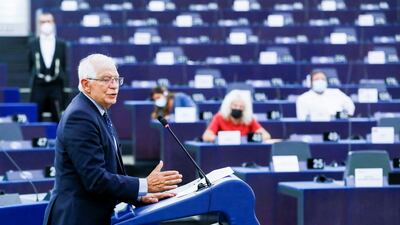The European Union’s foreign affairs chief has said the bloc has no option but to talk to the Taliban.
But he insisted that engaging with the hardline group did not mean recognising it.
Josep Borrell told the European Parliament that to have any influence on Afghanistan, the EU had “no other option but to engage with the Taliban”.
The EU has said the “level and nature” of its future relationship with the Taliban depends on a number of benchmarks, including respect for human rights, a free media and ensuring that Afghanistan does not again become a safe haven for terrorism. The bloc has criticised the make-up of the Taliban's interim government, which features no women and includes figures wanted by the FBI.
“Maybe it's a pure oxymoron to talk about human rights but this is what we have to ask them,” Mr Borrell said.
The EU is urging the militant group, which seized Afghanistan’s provincial capital’s last month in a lightning advance, to allow Afghans and foreign citizens to leave the country should they wish.
Mr Borrell said it was important the EU learnt lessons from Afghanistan and was self-critical in its understanding of “the lessons that we can learn on state-building efforts elsewhere in the world”.
“What has happened in Afghanistan should teach us a lot about this exercise of state-building, which is much more difficult than what President Bush could have imagined before the [2003] invasion of Iraq.
“What does it mean for our relations with the US? What does it mean for the development of a European strategic autonomy, for our security, and for our defence policy?”
As the Taliban tightened its grip on Afghanistan last month, chaotic scenes materialised as Afghans and foreign citizens attempted to flee the country.
Nato member states, which ended their near two-decade presence last month, were heavily reliant on the US military to secure Kabul’s airport amid the evacuation. This has led to renewed discussions in Brussels over the possibilities of an EU rapid reaction force.
Mr Borrell told the assembly that the bloc should be prepared for Afghans trying to reach Europe if the Taliban allow people to leave, although he said he did not expect migration flows to be as high as in 2015 due mainly to Syria's civil war.
Brussels will try to co-ordinate with member governments to organise a diplomatic presence in Kabul, Mr Borrell said.









